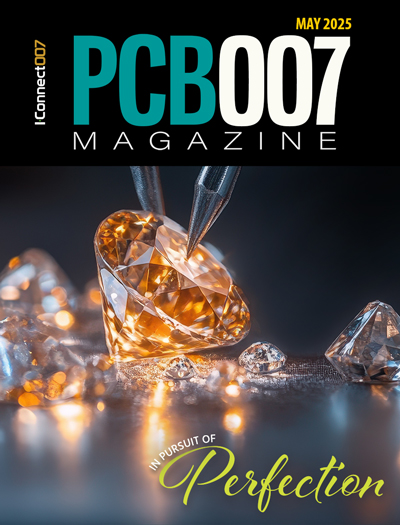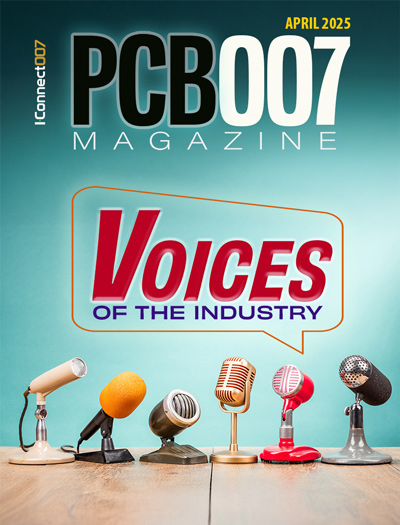-

-
News
News Highlights
- Books
Featured Books
- pcb007 Magazine
Latest Issues
Current Issue
The Hole Truth: Via Integrity in an HDI World
From the drilled hole to registration across multiple sequential lamination cycles, to the quality of your copper plating, via reliability in an HDI world is becoming an ever-greater challenge. This month we look at “The Hole Truth,” from creating the “perfect” via to how you can assure via quality and reliability, the first time, every time.

In Pursuit of Perfection: Defect Reduction
For bare PCB board fabrication, defect reduction is a critical aspect of a company's bottom line profitability. In this issue, we examine how imaging, etching, and plating processes can provide information and insight into reducing defects and increasing yields.

Voices of the Industry
We take the pulse of the PCB industry by sharing insights from leading fabricators and suppliers in this month's issue. We've gathered their thoughts on the new U.S. administration, spending, the war in Ukraine, and their most pressing needs. It’s an eye-opening and enlightening look behind the curtain.
- Articles
- Columns
- Links
- Media kit
||| MENU - pcb007 Magazine
Bring Our Industry Back? Shift Your Attitude
October 27, 2021 | I-Connect007 Editorial TeamEstimated reading time: 15 minutes
The I-Connect007 Editorial Team recently spoke with longtime columnist Dan Beaulieu about his recent series on bringing PCB fabrication back the the United States. Dan was happy to expound on his viewpoint. In this wide-ranging interview, he explained how our industry can rise up and take advantage of today's opportunities, and why we need to stop making excuses, such as blaming China for our problems.
Barry Matties: I wanted to talk about your recent series of columns on bringing PCB fabrication back to America. First, you noted a list of what you deemed as excuses that you have heard from fabricators over the years about why their businesses are struggling. No doubt, you’ve heard it all. Second, and the impetus for our discussion, was your statement, “Yet all we must do is figure out how to take advantage of this situation and find a way to bring our industry back, make it strong again.”
When you say, “bring our industry back,” what does that mean? What do you expect to come back? What about “making it strong again?” Are you saying that we’re going to bring back mass production? Are we going back to 3,000 shops, like we had in the 1980s?
Dan Beaulieu: The giant factories are not coming here; mass production is not coming back. I don’t see how it can. We must look at reality and do an attitude shift. In North America, we have a gap in business, maybe around $8 billion, that we could get back.
The whole premise of my column was that we’ve given up. When the business was growing by leaps and bounds in the 1980s, and we had 2,000 or 3,000 board shops, that global market was $10 billion.
Matties: And the profits were insane.
Beaulieu: Yes, and it was a relatively young industry. During this period, there was acceptance of terrible service, and there was a lot of R&D. I grew up with touchback schedules, and I was in one of the finest shops in America, the Rockwell shop in Maine. We had touchback schedules because we were doing cutting edge, and our customers still had their board shops.
Everybody had their shops, like IBM and RCA. Development was being done there. But you’re right, the profits deteriorated. To me, this is more a call to the owners.
Now, if you look at the column, it talks about strategy. All of us are pulling our hair out because there are not enough people doing marketing. If you think about marketing, it’s developing strategies for your own business, whether it’s $3 million or $50 million. I worked with companies that live their lives on strategy. They’re figuring out where their company is going all the time. Leading companies have whole teams of people doing this.
There might be a few smaller companies that do true marketing, allowing us to sit down occasionally and talk about the strategy of the company. We talk about things like, “What does this company mean? Where are we going tomorrow? Not in two months, but in five years.” The Japanese are doing it; the Chinese are doing it. You can look at the capacitors, all the components—it’s all planned strategy. Remember the old NEC thing where they were going four years in advance to load the system? We don’t do any of that.
Once a year, I’ll show up in a shop and wrestle them to the ground for two days to talk about their company, and where it’s going. Frankly, they’re bored to death. They can’t wait to get out of there. There will always be a guy who comes up with something like a super board they built once, and then you lose them. They start talking about the super board, or anything but the customer and their strategy.
I focused my column on the tactics for how to get there. What do you care about? There’s a joke I’ve said a thousand times: When you run out of customers, you buy a drill machine, and you think the drill machine will solve it. We always think technology will solve it. Well, if no one knows you have that technology, who will beat a path to your door? They don’t even know you have the mouse trap. That’s the space we’re in and it gets particularly frustrated. Saying it again: What is marketing? What is branding? It’s all sitting down to think about your company, and what the company is.
Matties: Marketing is your ability to communicate the story.
Beaulieu: Perfect.
Matties: Once you have the strategy, then you must tell your story. You can’t just buy a drill, and say, “That’s our strategy.” You must go out and say, “Here’s what we’re doing. Here’s what it means.” There are a lot of examples of those doing this quite well in our industry.
In our October PCB007 Magazine issue on capital expenditures, we focused right to the heart of what you’re thinking. When people are coming to capital expenditures, they’re looking at their strategy. Some expenditures are more strategic. To me, method is more of a competitive advantage than the actual piece of equipment.
Beaulieu: Yes. All the things I listed in my column, all the excuses: “We know all these things. We’re screwed by China. IPC is not supporting us.” Blah, blah, blah. That’s not the point at all. So what? Companies who do well are doing it intentionally. For exampIe, I’m watching Calumet and they could have sat back and added 10 more excuses to my list. “We’re out in the middle of nowhere,” for example. But look at what they’ve done with strategy. They laid out what they would do and look at where they are today.
Matties: Yes. They are telling their story. Another factor in strategy is automation. It’s going to happen one way or the other over time, whether you want it to. You will either embrace it, or ultimately be priced out of the market because labor is going up.
Beaulieu: Yes, and it will continue to go up. I don’t want to mistake this for my political philosophies, but CEOs used to be paid six times what an employee was. Now they’re 12 and 13 times more. That’s a factor. It’s pretty bad when government handouts exceed pay. That’s not what they were supposed to do. And we’re seeing that.
Once again, we get back to attitude. You really think you have a great place to work if you can’t even convince people to work there? I’ve been in more than one shop where they’ve said, “We’re in a closed room. These people have no future here.” Well, if that’s the way you feel, then that’s why they’re leaving. As a leader, you must create the future. You must create the career path. Let’s face it. We know companies where a good person with a high school diploma in customer service is making more than a first-year teacher with a four-year, $200,000 degree. There are opportunities, and we know people who have made a lot of money in this industry.
Matties: Yes, but to your point of strategy, there must be a strategy of changing the way that you attract people.
Beaulieu: Exactly. There’s an attitude right now, right or wrong, of geopolitical animosity with China. The respirator/ventilator shortages, and other shortages, made us open our eyes and ask, “What did we give up for a $29 DVD player?”
I believe that will flatten, but it’s going to make our customers more cognizant, “There’s more we can do here. There’s another level of circuit boards we can buy.” I believe we are still the most innovative country in the world. We still have Silicon Valley. We still have Austin. We are still developing some pretty cool stuff. You and I talk about that all the time. It’s not going to China anytime soon—like SpaceX or Blue Horizon, for example. It stays here for a long time. How many Blue Horizon rocket ships are you really going to make?
Nolan Johnson: Dan, looking forward, this is an opportunity for our industry in North America to retool and refocus. I think we’ve established in this conversation that going after the mass volume is not the right approach. So, what do we focus on as an industry?Page 1 of 2
Suggested Items
I-Connect007 Editor’s Choice: Five Must-Reads for the Week
06/20/2025 | Andy Shaughnessy, I-Connect007It’s been a busy week in this industry, and we have news and articles from the PCB design, fabrication and assembly communities. Some of this news is out of this world. We may be losing the high ground—the really high ground. Columnist Jesse Vaughan explains how the U.S. seems to be falling behind in space, and how this could affect our ability to defend ourselves in the future. We have an update on the U.S.-China tariff talks, which seem to be moving forward, though sometimes at a snail’s pace.
MRSI Systems, LLC Files Patent Infringement Lawsuit Against Suzhou LieQi in China
06/16/2025 | MRSI Systems, LLCMRSI Systems, LLC (a part of Mycronic Group), a global high-tech company that provides high precision production solution in electronics industry, filed a patent infringement lawsuit against Suzhou LieQi Intelligent Equipment Co., Ltd. (SZLQ) with Shenzhen Intermediate People’s Court for infringement of MRSI Systems’ patent related to die bonder (Case No. (2025) YUE03minchu No. 7154).
Takeaways from the Keynotes at the Edinburgh EIPC Summer Conference
06/16/2025 | Pete Starkey, I-Connect007It was seasonably wet and windy in Edinburgh, Scotland, June 3-4, where delegates from 17 countries convened for the 2025 EIPC Summer Conference to enjoy a superlative program of 18 technical presentations over two days, plus an excursion to a whisky distillery. EIPC President Alun Morgan welcomed everyone to the Delta Hotel, reminding us that in its previous iteration, it was the Royal Scot, traditionally the annual venue of the Institute of Circuit Technology Northern Symposium.
Global Citizenship: Cultivating Cross-border Partnerships With Integrity
06/11/2025 | Tom Yang -- Column: Global CitizenshipWith rising geopolitical pressures, cross-border partnerships are essential for businesses looking to expand their reach, enhance innovation, and drive sustainable growth. However, these partnerships thrive only when founded on trust and transparency. Otherwise, even the most promising collaborations can quickly unravel, leading to financial losses and reputation damage.
Enough Talk—Time to Strengthen America’s Microelectronics Industrial Base
06/09/2025 | James Will, USPAEThe U.S. doesn’t have an innovation problem in terms of microelectronics, or a talent problem or even an investment problem. What the U.S. has is a coordination problem, and that’s threatening the livelihood of our domestic microelectronics ecosystem.


